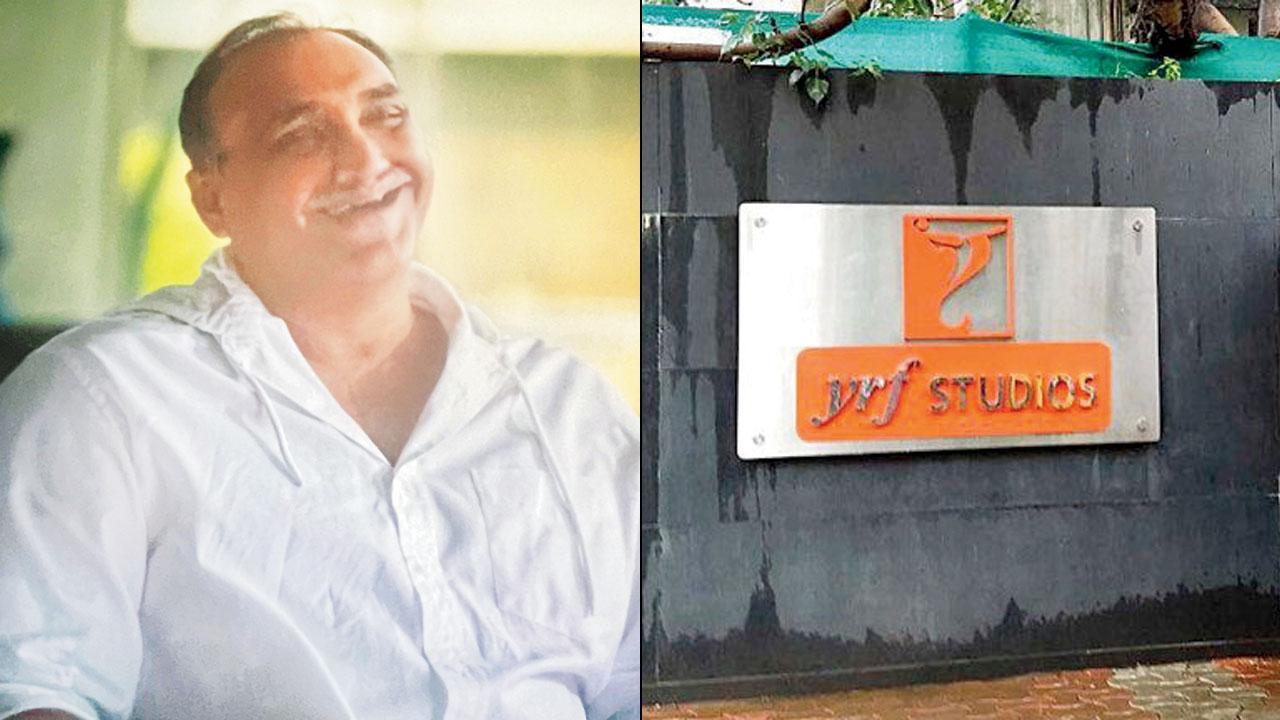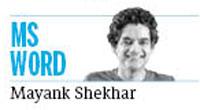Okay, making a request for chat/interview, now that Bollywood’s oldest rumour has outed himself!

Producer Aditya Chopra, as seen on screen, inside Yash Raj Studio preview theatre, at the maiden screening of Netflix documentary series, The Romantics, on Yash Raj Films (right) the Yash Raj Films studio
 A friend of mine, for whom Yash Raj Films was a client, went over to meet producer Aditya Chopra at his office, circa 2005. The big poster on the wall, friend said, was City of God (2002), the seminal Brazilian grime-crime film, that’s inspired Indian content, right up until Sacred Games (2018).
A friend of mine, for whom Yash Raj Films was a client, went over to meet producer Aditya Chopra at his office, circa 2005. The big poster on the wall, friend said, was City of God (2002), the seminal Brazilian grime-crime film, that’s inspired Indian content, right up until Sacred Games (2018).
ADVERTISEMENT
Only something I couldn’t associate with Aditya, director of Dilwale Dulhania Le Jayenge (DDLJ, 1995), Mohabbatein (2000), etc.
During the meeting, Aditya kept getting calls from a particular number, that he kept disconnecting still. He finally answered the phone, barking at a major movie star at the other end, “Who died? If I’m not picking up, can’t you tell I’m busy?”
This was the first sighting by someone I knew, hence a primary source, to report that Adi Chopra, indeed, exists. And it goes well with how movie star Abhishek Bachchan describes Aditya, as a child, in the Netflix documentary series The Romantics—an adorable corporate film on Bollywood’s most loved studio.
With a studio, what we mean here is not just shooting floors, production house, or moneybag, with power to greenlight scripts. We’re staring at a company with, I’m guessing, 200-plus film professionals, on monthly salaries, from spot-boy to director-screenwriter, working all-year on multiple movies’ pre-/post- and production itself.
Also Read: Holy cow! Who shall I hug next?
The product that emerges has its front plus back-end integrated, down to music, talent management, digital rights, even theatrical distribution worldwide.
Finance is in-house. So are rewards, ploughed back into the upcoming films. As Yash Raj’s top screenwriting employee, Jaideep Sahni (Bunty Aur Babli, Chak De! India) told me once, “This is the sole movie company that will live and die on the Avid (edit machine)—as in with hits/flops.”
This conversation is from a time corporate studios that had entered Bollywood were primarily playing the shares and evaluation game; like the 2023 start-ups, really. For many big-time individual producers still, cinema is also a hobby, or side hustle; tea, or real estate, could be their main business.
Yash Raj is uniquely how Bombay’s film companies used to be—Imperial, Bombay Talkies, Wadia, Ranjeet, etc—before the studio system collapsed, shortly after independence.
As with family-owned firms, Aditya inherited Yash Raj from his dad, the great director Yash Chopra, who began as a producer with a small office in Rajkamal Studio, having branched out from his elder brother, Baldev, back in the early ’70s.
Except that Aditya is chiefly the architect of Yash Raj as the self-sufficient film empire we know it. And that’s because he made it clear to his father that he would debut as director, only with a film that was internally funded. His father, Aditya reveals, was more a director, than a producer—satisfied, so long as money made it to the table, hence the next movie.
The dad, given his humbler background, “played safe”. The son was the “rich kid”, who could aim higher! Aditya’s directorial debut, at age 24, was DDLJ—a film that, technically, never left the cinema: “Imagine if we had to share 50 per cent profit,” Aditya shares in The Romantics, where star-actor Abhishek lets in on how he knew this filmmaker-friend growing up.
He was named ‘Cheeni’. Don’t know if this is with reference to the Chinese, who beat Indians in the 1962 war. The kids would presumably run after hearing that nickname, for the bully Aditya was in the house. By now, I’ve met hajaar people who’ve interacted closely with Adi—that’s what everyone, regardless of hierarchy, calls him.
He’s supposedly straightforward, deeply sincere with ideas, intent, and paycheck. Besides, obviously a rare kingmaker/ringleader, who’s launched more film talents than anyone in India, including stars—among others—Ranveer Singh, Anushka Sharma, Arjun Kapoor.
All three of whom, I’m told, were separately given the same advice by Adi, before their big break—something along the lines of: “You’re ugly. Work harder!”
Adi, I’m told, is a workaholic himself—also, an apparition, of course. He’s made no public appearance since he picked up the Filmfare Award for DDLJ in 1996.
Maybe we’ve bumped into him, how’d we know? We’ve known about how he catches first-day shows of all new films, with a notebook, at the cinema, to gauge audience response. I suppose he’s left alone.
With this enforced anonymity, Adi may have left behind a great showbiz insight: that 24x7 privacy, for starters, is not that hard to pull off; or is it? Also, fame itself is infinitely overrated; unless you’re a performer, and then it’s obviously unavoidable. We figured this decades later, with the inescapable spectre of identity, collective opinions, AI, and social media.
Adi sticks to films—evidently inspired by Kurosawa, who would regularly disappear from the world, only to return to it with a new release.
Which explains the furious excitement, right inside Yash Taj Studio, where I watched parts of the sweetly hagiographical The Romantics, directed by Smriti Mundhra (Indian Matchmaking), that kicks off in the second episode, with Adi’s rarest public appearance.
He works from the office right above this preview theatre. His onscreen interview, the point of the series, is still an awe-inspiring, ‘aha’ moment, as if from a creature pic!
I feel doubly glad now that desi pop-culture’s oldest rumour has outed himself. Pushing in a request for a more journalistic chat/interview—naah, off-the-record won’t do.
Mayank Shekhar attempts to make sense of mass culture. He tweets @mayankw14
Send your feedback to mailbag@mid-day.com
The views expressed in this column are the individual’s and don’t represent those of the paper.
 Subscribe today by clicking the link and stay updated with the latest news!" Click here!
Subscribe today by clicking the link and stay updated with the latest news!" Click here!








